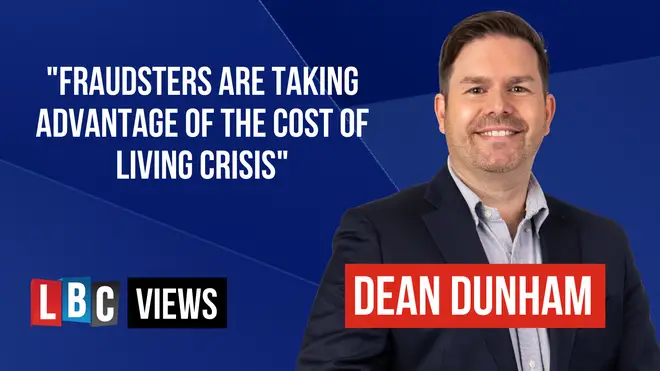
Iain Dale 10am - 1pm
20 May 2022, 11:47

The head of the UK’s specialist police unit for fraud put out a warning last week that the cost of living could be the next frontline for scammers, with criminals using the crisis as a way to lure potential victims.
But as many listeners of the LBC Consumer Hour have been telling me, it’s not a case of ‘could be’, fraudsters already are taking advantage of the cost of living crisis with a range of scams aimed at those who are struggling to make ends meet.
Here are the most common scams you need to look out for:
Energy swaps The cost of energy has gone through the roof and many people are reporting that their monthly direct debits have doubled. It is therefore going to be enticing if you are told that you can reduce your costs as Lisa from St Helens discovered. She received an email purportedly from an energy comparison site. The email stated that the site had an exclusive deal with two suppliers that could offer tariffs cheaper than the current price cap. Lisa jumped at the chance and clicked the link in the email that tool to her to an online form to complete. It was a fraud as she discovered when she asked me about it.
Council tax rebate Government announced a council tax rebate for all properties in bands A-D earlier in the year. Fraudsters have latched on to this as Liam in Southampton discovered this week. He received a text message headed “Claim your £150 council tax rebate today”. The message went on to explain that claiming was easy and simply involved clicking a link and completing a form and providing bank details. However, Liam got suspicious as the text did not say who it was from so he sent me a copy and asked for my view; clearly, it was a scam.
Shopping deals The internet is littered with shopping deals; including discounts and vouchers. Whilst a great deal of these will be genuine many are nothing more than a scam as Dianne from Ealing discovered recently. She responded to a voucher code deal online. She was asked to pay a fee in order to receive the voucher codes she wanted and was distraught to then find the vouchers did not work as she had been the victim of a scam. Legitimate companies will not ask you to pay any money for their online coupons.
Covid loan Throughout the pandemic Government has made various loan schemes available to businesses affected by Covid. Fraudsters have decided to extend this to individuals and have sent out waves of emails offering cheap loans and in some cases grants. Adam in North London received one of these emails. It said “EVERYONE WILL BE ACCEPTED” and went on to explain that the interest rate was 1% and there would be no repayments for 3 years. This is just what he needed so he quickly clicked the link and provided all his details; name, address, date of birth, bank details, national insurance number and his partners' details. He also made what was described as an admin fee payment of £45.99. Of course, no loan monies materialised so Adam quickly knew he had been scammed. However, he had thought the extent of the scam was the loss of his £45.99 but it then got worse. The fraudsters took on his identity, taking on credit in his name and causing havoc with his credit file.
Get rich quick schemes With the cost of living crisis taking a firm hold on people’s lives the promise of making quick cash can be very enticing as Georgina from Nottingham explained to me. Georgina is a single mother of two young children and is finding it hard to meet all of her financial commitments. She received an email in December 2021 which she took as being from an official Government Department.
It said Government was allowing individuals to pay £10 per week into the Government overseas gold fund and that on 1 June 2022 the investment would be paid back along with a guaranteed return of £500. Georgina tells me she didn’t give it a second thought, she asked her mum for a loan to pay the £10 per week and signed up and proceeded to make the £10 per week payments. When making her payment at the start of May it was rejected by the recipient bank as the account had been closed down. She then discovered it had all been a scam.
As I always say, if it sounds too good to be true it's almost certainly a scam and never click on a link in an email or text without first researching that the sender is genuine.
If you’ve been a victim of a scam or have heard of a scam get in touch with me on the LBC Consumer Hour (9pm Fridays) – 0345 60 60 973, text 84850 or tweet @LBC